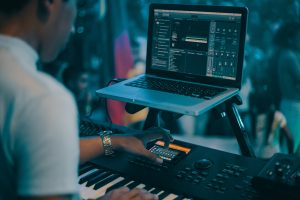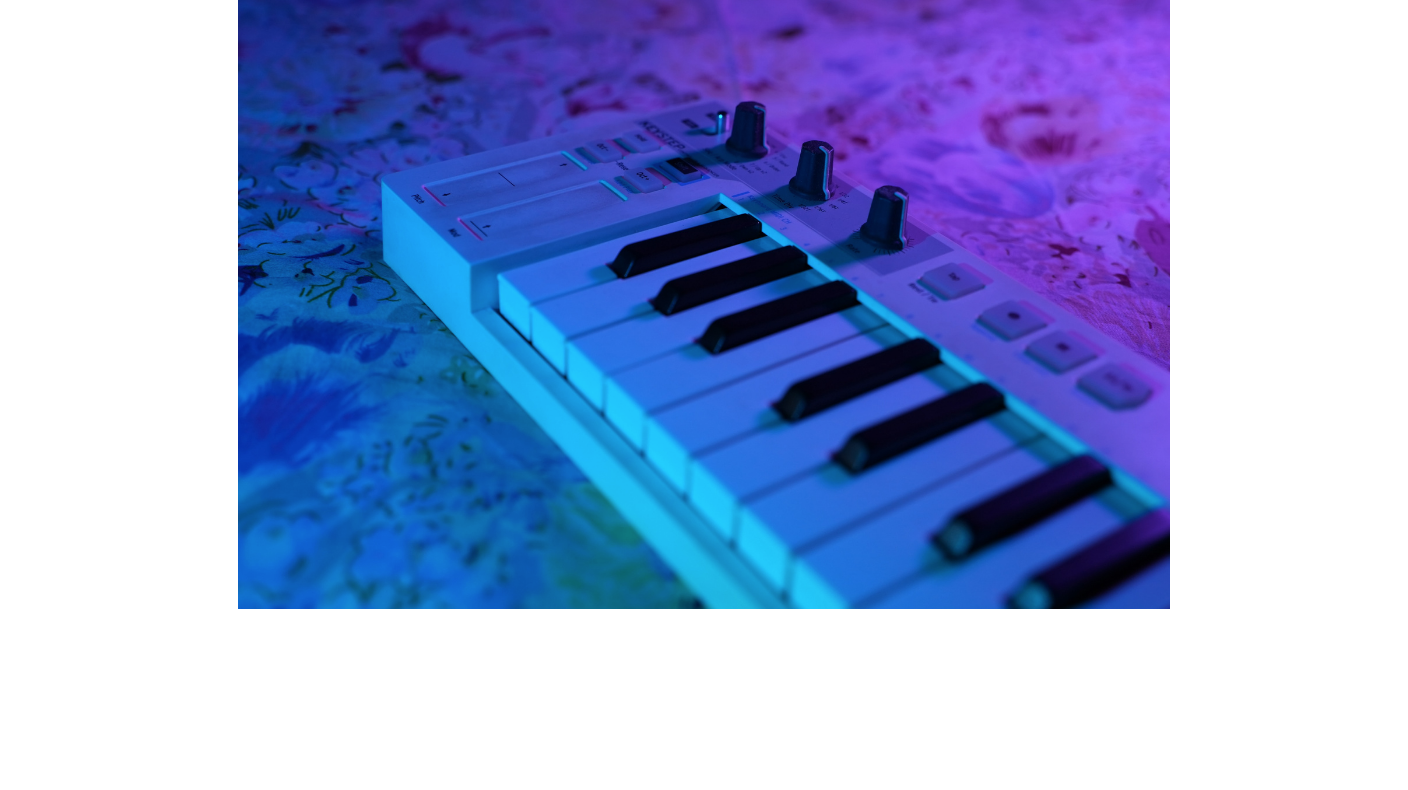Producing music is often one of those areas that’s overlooked – most notably, the equipment. Especially midi controllers!
Which unless you’re a music producer yourself, come across more like an alien alternative to a keyboard if anything. On first glance, some can even be mistaken for a child’s keyboard, which as you can expect, can get producers riled. Especially when this ‘children’s toy’ retails for over $500!!
So with that, what are midi controllers? Why do music producers have them in their studio? And how do they help to make music? Here’s your answer…
What is a midi keyboard?
Much as it sounds, a midi keyboard is indeed a breed of keyboard. A more modern one at that, which has only really gained popularity with music producers since the 1990s.
And while midi itself has quite a complex history, midi keyboards are actually fairly easy to understand. In essence, midi controllers are a platform, specifically designed for producers. One that allows them to programme specific inputs/ notes into their Digital Audio Workstation (i.e. recording software) in order to construct a song.
Think of it like how a games console translates your moves on the gamepad into actions on the screen. While a PS4 controller can help you hijack a car in Grand Theft Auto, a midi controller can help you key in the right notes/ arrange your composition on recording software.
In fact, the more you look into it, there’s very few similarities between a midi controller and your conventional keyboard.
If you want to learn more about midi controllers, as well as discover some of the best to ever exist, do check out this blog.
Midi keyboard VS piano keyboard – what’s the difference??
Despite the fact that midi controllers look like a keyboard that’s had a few extra trinkets added to it, there’s actually a whole heap of differences between the two. To help you spot what these are, here’s a rundown of the 6 most common…
- Speakers & audio
The first (and arguably most notable) difference between a midi keyboard and a conventional keyboard is speakers. Put simply, while conventional keyboards have them, midi controllers do not.
Reason being that midi keyboards are specifically designed to be plugged into your laptop, so as a result, they rely on the speakers in your laptop to emit sound. A knock-on effect of this is that midi controllers are usually significantly lighter than the equivalent-sized keyboard.
- Portability
With conventional keyboards, you’ll struggle to find anything that’s incredibly compact. And if so, there’s a good chance that the keyboard itself ain’t going to be good quality. Either that or it’ll be specifically designed for kids. Whereas with midi controllers, you’ve a lot more options in terms of size.
25 key midi controllers are actually the most popular (even amongst professionals), with mega 88 key controllers being reserved for the audio setups of true audiophiles. Team that with their lower weight, & it’s fair to say that midi controllers wipe the floor with conventional keyboards when it comes to portability.
- Key count
For those after a specific amount of keys, midi controllers offer a far wider variation.
Aside from controllers with 25 keys, you can also get midi keyboards with 32, 37, 49, 61 & 88 keys!! A whole bunch of octave combos, which you’ll struggle to find with any conventional keyboard that’s aimed at professionals.

- Ability to create sound
A stand-out difference between both midi controllers and conventional keyboards is the way in which they create sound. While your conventional keyboard comes with speakers & a whole host of stock sounds built-in, midi controllers don’t.
And while you could argue that this makes midi controllers useless, when you plug them into recording software, you soon realise that they’re anything but; the sheer scope of what midi keyboards can do is quite mind-boggling! Opposed to in-built sounds, midi controllers rely on virtual/ software instruments – these are instrument sounds you install on your computer.
So in terms of creating sounds, they’re by far the most flexible. You could even say that with a midi controller & a software instrument suite, the possibilities are endless!!
- Software integration & DAWs
While both a conventional keyboard & a midi keyboard can work in tandem with music production software, this is where midi controllers have the edge.
Because aside from the fact that not all conventional keyboards will be able to integrate (they require midi inputs/ outputs), a midi controller gives a producer FAR more options when it comes to sound design. Typically, a conventional keyboard will just allow you to use the keys with software – perhaps a few buttons at most. Whereas with a midi controller, you can use:
- Keys
- Buttons
- Faders
- Touch strips
- Drum pads
In order to create the exact sound that you’re after. And what’s more, midi controllers also come with velocity sensitivity built-in, as well as perks like aftertouch. All of which allow producers to inject that extra layer of feel into their sound.
So yes – on the surface, both can work with DAWs & recording software. However, there’s no doubt about it that midi controllers do it better.
Want to discover how to turn a conventional keyboard into a midi controller? Jump into this video…
- Overall design & vibe
There’s no escaping that when it comes to design, midi controllers are far more flamboyant on pretty much every level when it comes to design. In fact, the majority make conventional keyboards look pretty vanilla.
With all their faders, extra knobs & LED drum pads, midi controllers are far more playful. But then again, they have to be, as when it comes to making music with a midi keyboard, options are everything! So the more funky ways in which a midi controller can give a music producer for making music, the better.
Why do music producers use midi controllers in their studio? How do they help to make music?
If you’re not clued-up on modern music production, then chances are midi keyboards will leave you with a puzzled grin on your face.
After all, to the unsuspecting eye, a midi controller looks (for the most part) like a children’s toy. In the case of colorful controllers like the Akai MPK Mini, it’s not uncommon to wonder how something as playful as this is put to use in modern music production. Let alone used to make hit songs!!
So to help clear the air, here’s just 3 reasons why midi controllers are so incredibly popular with producers & why you should take them seriously…
- Workflow & ease of use – When it comes to keying sounds into a DAW, there’s few easier ways to do so than with a midi controller. The majority of controller keyboards are ‘plug-in-&-play’, which means there’s no setup required – great if you’re looking to instantly lay down a golden spark of inspo! What’s more, their portability + the fact they can be used in tandem with phones & tablets, makes them the ideal backpack accessory for on-the-go production. As far as workflow goes, they’re a God-send!!
- Enhanced control over sound – One of the major benefits of any midi keyboard is the control it gives you over sound. Because not only can you use pretty much whatever sound you like to make music with a midi keyboard, but you can also control that sound however you like too. Fancy upping the bass with a fader? You can do that. Want to tap out your hi-hats on drum pads? That’s possible. Fancy controlling the levels of your effects using a physical knob? You can do that too. The possibilities with midi are virtually endless!
- Portability – Not everyone finds inspo within the walls of a music studio; some of the best ideas come to us we’re not even thinking about them. In other words, when we’re on the move. Something that back in the days of physical studios may have been a problem, but not with midi controllers. Have a specific sound or beat come to mind & all you have to do is open your laptop & key your idea into your midi controller. Thanks to mini midi controllers having just 25 keys & being incredibly lightweight, these are easily something you can take with you on the move.
Some of the best midi controllers you can buy today…
- Akai MPK Mini MK3 – If you’re after a solid 25-key midi controller, you’ll struggle to find better than the MPK Mini. Now in its third generation, this is the most popular midi controller out there today. Get hands on with this midi controller & what with all the drum pads, switches & even a screen, it’s not hard to see why.
- Arturia Keylab 49 – A cut-size midi controller with all the toys most producers need for making music. Assignable faders, pitch & mod wheels & a whopping 16 drum pads are just a couple of the perks you’ll find with this keyboard. Team that with Arturia’s stand-out build quality & there really is little to grumble about with this midi controller.
- Native Instruments S88 – For those after fully-weighted hammer action keys like those on a piano, then the S88 is the midi keyboard to have. No debate! Not only does this midi controller have an Italian keybed made by Fatar, but it also comes with aftertouch, a huge display & every input/ output you can think of. The Komplete Kontrol sound suite (included with this keyboard) is one of the best in the business too!


